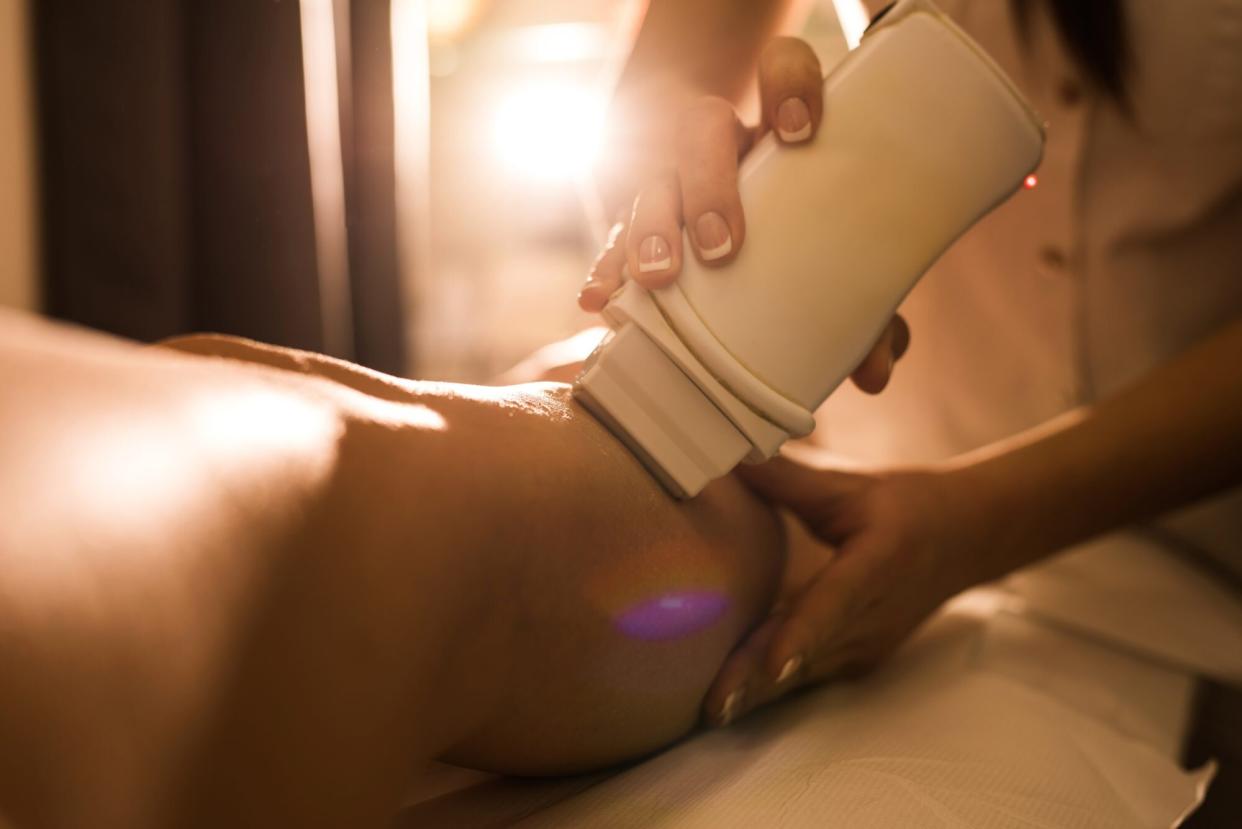Memorize These Laser Hair Removal Red Flags to Help You Choose a Safe Salon

Getty Images
When you shop for skincare products, you consider your skin type and goals. If you get lip filler, you scroll through dozens of before/afters to ensure you like the injector's work. Well, the same due diligence should go into play when picking a laser hair removal salon.
There are many factors to consider, particularly skin tone and conditions.
So, before you purchase that laser hair removal package on Groupon, here's what experts say you should look out for — and if the salon doesn't meet these standards, consider it a major red flag.
RELATED: 15 At-Home Laser Hair Removal Devices That Actually Work
Before and After Pictures
A legit establishment should be able to provide before and after photos of their clients, to show you what results to expect. This is especially important if you have melanin-rich skin, as not all lasers will work on dark skin tones.
A Variety of Laser Hair Removal Machines
There are many types of laser hair removal devices, and varying types of skin will react differently to each one. Therefore, it's important to use the right machine to prevent irritation and ensure optimal results.
Christian Karavolas, a laser hair removal expert and founder of Romeo & Juliette Laser Hair Removal in Manhattan, says people of color should ask the salon whether they have experience in treating dark skin and if they have an Nd:YAG laser for that purpose. "Also, ask for before and after photos to ensure the results are what you're looking for," he says.
For caucasian skin types, Mercedes Doan, Ever/Body's Manager of Aesthetic Services & Education, says that Alexandrite is the best type of laser. "[They} work the quickest of all laser types and are best for treating larger body areas," she says.
Available and Up-to-Date Certifications
You wouldn't go to a doctor who doesn't have a degree, and the same goes for laser hair professionals. Apart from having gone through laser hair training, most states require certification for providers to legally offer treatments, so look into your state laws and if your salon is up to par.
Additionally, Doan says that a licensed aesthetician or a nurse practitioner are the best choice when it comes to providers who can perform the treatment with safest standards.
VIDEO: Why Sugaring Could Replace Waxing as Your Go-To Hair Removal Method
Online Reviews
Karavolas says that an effective way to learn about a laser hair removal salon is to read customer reviews and referrals. These may not be available on the salon's site, as they'd only feature positive reviews, so look on sites such as Yelp and Reddit, and even the salon's social media pages.
Consultations and Patch Tests
Before you start treatment, your provider should sit down with you to ask about your skin type, concerns, conditions, tone, medical history, and more. Once that's done, your provider should do a small patch test on the treatment area to test the strength of the laser to make sure it doesn't irritate your skin or hurt too much. (Laser hair removal should feel like a rubber band slapping your skin, nothing stronger.)
Doan says that if the consultation is rushed or there's not much discussion on the process and the provider goes straight to the treatment, it's a major red flag.
What Are Some Other Red Flags to Look For?
Karavolas says that apart from the above, another red flag is if the provider doesn't ask about recent sun exposure (tans can effect the efficacy of the lasers) and if their equipment isn't up to date.
A clear sign that the lasers aren't up to date is if the provider applies gel to the treatment area before starting. "Those types of lasers only de-stimulate the hair growth while getting treatments, but once you're done getting treatments the hairs grow back," explains Doan. "That's because those lasers target melanin in order to be effective. That's also why it is a big no for people of color — these lasers can't differentiate between natural melanin in your skin and melanin in your hair, which can lead to burns."
Lastly, your provider should instruct you on the best pre- and post-treatment directions, as doing otherwise can cause skin irritation and decrease treatment efficacy.
